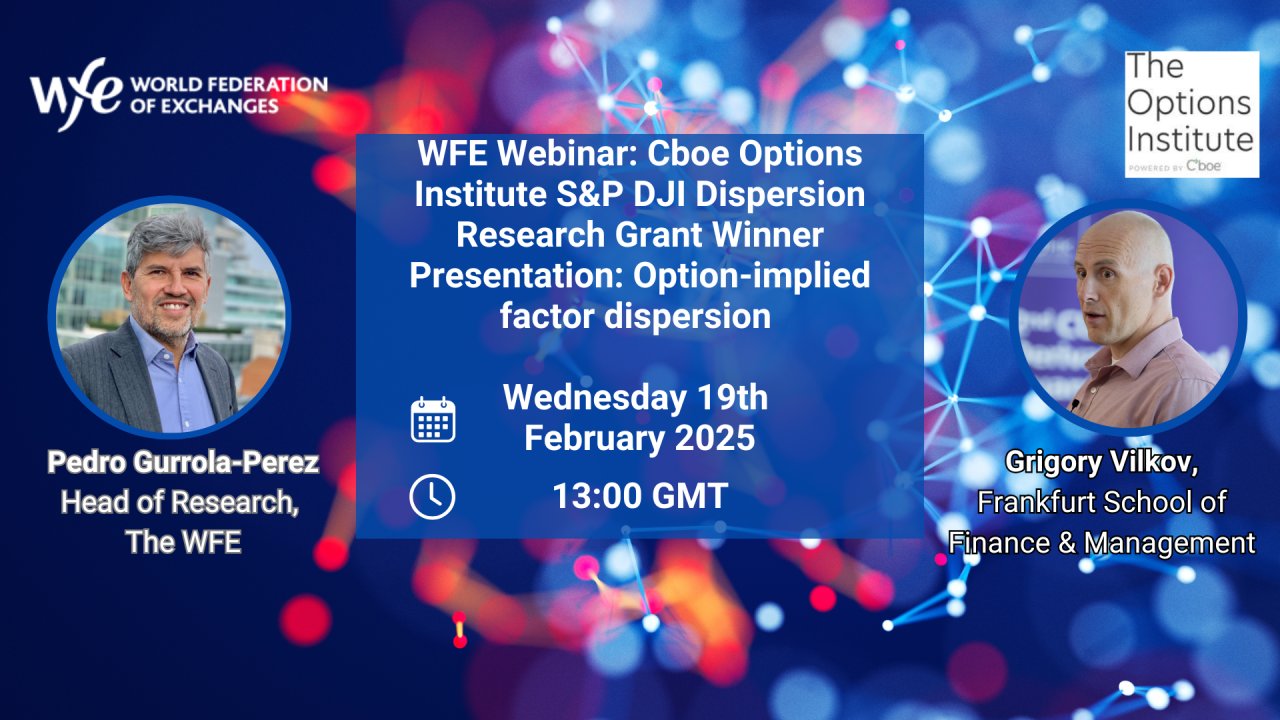WFE Webinar
WFE Webinar: Cboe Options Institute S&P DJI Dispersion Research Grant Winner Presentation: Option-implied factor dispersion

In this webinar, the winner of Cboe’s Options Institute Research Grant Programme will present his research.
Abstract:
Dispersion strategies capture the difference in variance dynamics between a basket and its components. Even though smart-beta indices intend to load heavily on a particular factor, factor dispersions based on such baskets are exposed to risks of other factors and idiosyncratic variances. Analyzing factor dispersions through a linear factor model and equicorrelation representations, we recover driving forces behind dispersion dynamics and work out an attribution of a dispersion risk premium. As a balanced combination of systematic and idiosyncratic variance components, dispersion and its risk premium provide signals about future changes in systematic and alpha-based investment opportunities.
About The Options Institute:
For 40 years, the Options Institute (OI) has served as a resource for seasoned options traders as well as those just getting their start in the world of derivatives. As the education arm of Cboe Global Markets, it works to increase the understanding of derivatives and of the broader financial marketplace via delivering superior education experiences that are memorable and accessible. The OI is also committed to supporting research that catalyzes the understanding and adoption of derivatives products. With this aim, the OI Research Grant Programme awards grant recipients access to Cboe historical data sets to support their research efforts.
Format: There will be a 45 min conversation followed by an audience Q&A.
This is an open event. Feel free to share with colleagues inside your organisation who may be interested.
Pedro joined the World Federation of Exchanges in October 2019 from the Bank of England, where he led the Financial Market Infrastructures Directorate’s Research Team. He had joined the Bank of England in 2013, after two years at the UK Financial Services Authority. Previously, Pedro spent more than 15 years lecturing and doing research at a range of well-regarded academic institutions, including the University of Barcelona and the Instituto Tecnológico Autónomo de México (ITAM).
Pedro holds two PhDs: one from the University of Barcelona, Spain, and one from the University of Montpellier, France, and has published across key academic journals, including the Journal of Financial Market Infrastructures, the Journal of Risk, International Finance and the Journal of Futures Markets. His recent work includes research on the economics of distributed ledger technologies (DLT) for securities settlement, on the network structure of settlement fails and on market liquidity risk in CCPs. He has also published research on payment systems, back-testing methodologies and on the structure of interest rate futures markets. In 2007 he received the National Award on Derivatives Research, awarded by the Mexican Derivatives Exchange (MexDer).
Grigory Vilkov is the Professor in the Department of Finance at the Frankfurt School of Finance & Management. Grigory received his Diploma in finance from the Finance Academy of the Government of Russia, then got an MBA from the University of Rochester William E. Simon School, and continued his study in INSEAD to get the M.Sc. and Ph.D. in Management. In 2008 he joined the Goethe University Frankfurt as Assistant Professor, finished the habilitation in 2012, and then stayed there until 2014 when he moved to the Frankfurt School of Finance & Management. In the Fall of 2013, he also visited the University of Mannheim as a Professor of Finance. Starting in 2013 Grigory is acting as principal investigator in the Center of Excellence SAFE (Sustainable Architecture for Finance in Europe). He worked for a number of years in derivatives trading, and then managed a privately held fund trading on the equity and equity derivatives markets. After some short experience with large banks, he worked as a partner in a company specialized in market execution systems for algorithmic trading on the stock and option markets, and a company building a grid computing technology used on Wall Street, and some others. Grigory's professional designations include FRM (Financial Risk Manager) from GARP and PRM (Professional Risk Manager) from PRMIA. Grigory's preferred topic so far has been the use of derivative instruments and option-implied information in asset pricing and portfolio management and general equilibrium modeling with frictions.